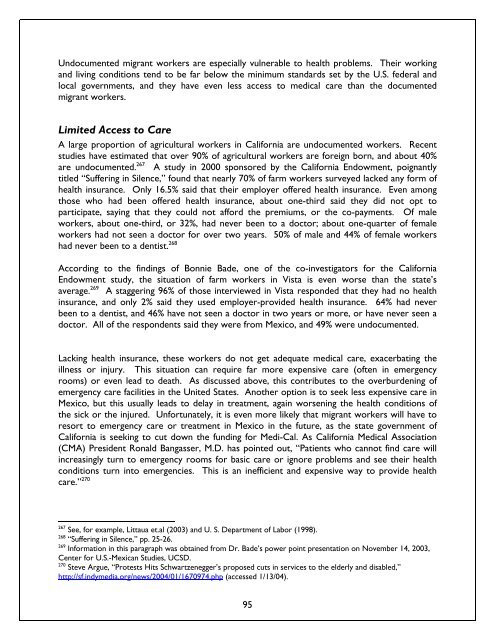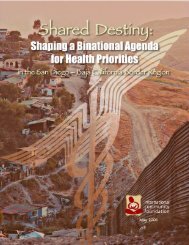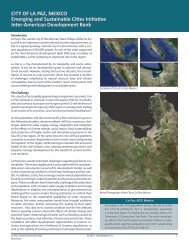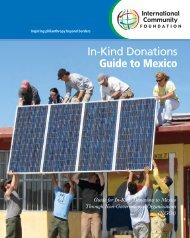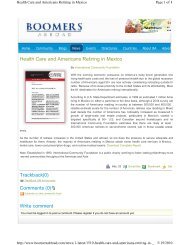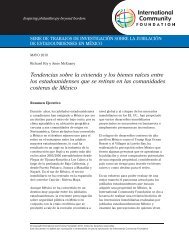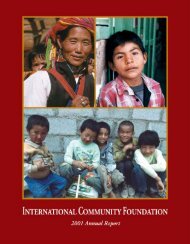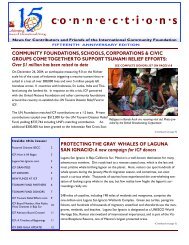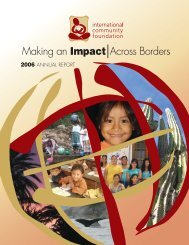Blurred Borders - International Community Foundation
Blurred Borders - International Community Foundation
Blurred Borders - International Community Foundation
You also want an ePaper? Increase the reach of your titles
YUMPU automatically turns print PDFs into web optimized ePapers that Google loves.
Undocumented migrant workers are especially vulnerable to health problems. Their working<br />
and living conditions tend to be far below the minimum standards set by the U.S. federal and<br />
local governments, and they have even less access to medical care than the documented<br />
migrant workers.<br />
Limited Access to Care<br />
A large proportion of agricultural workers in California are undocumented workers. Recent<br />
studies have estimated that over 90% of agricultural workers are foreign born, and about 40%<br />
are undocumented. 267 A study in 2000 sponsored by the California Endowment, poignantly<br />
titled “Suffering in Silence,” found that nearly 70% of farm workers surveyed lacked any form of<br />
health insurance. Only 16.5% said that their employer offered health insurance. Even among<br />
those who had been offered health insurance, about one-third said they did not opt to<br />
participate, saying that they could not afford the premiums, or the co-payments. Of male<br />
workers, about one-third, or 32%, had never been to a doctor; about one-quarter of female<br />
workers had not seen a doctor for over two years. 50% of male and 44% of female workers<br />
had never been to a dentist. 268<br />
According to the findings of Bonnie Bade, one of the co-investigators for the California<br />
Endowment study, the situation of farm workers in Vista is even worse than the state’s<br />
average. 269 A staggering 96% of those interviewed in Vista responded that they had no health<br />
insurance, and only 2% said they used employer-provided health insurance. 64% had never<br />
been to a dentist, and 46% have not seen a doctor in two years or more, or have never seen a<br />
doctor. All of the respondents said they were from Mexico, and 49% were undocumented.<br />
Lacking health insurance, these workers do not get adequate medical care, exacerbating the<br />
illness or injury. This situation can require far more expensive care (often in emergency<br />
rooms) or even lead to death. As discussed above, this contributes to the overburdening of<br />
emergency care facilities in the United States. Another option is to seek less expensive care in<br />
Mexico, but this usually leads to delay in treatment, again worsening the health conditions of<br />
the sick or the injured. Unfortunately, it is even more likely that migrant workers will have to<br />
resort to emergency care or treatment in Mexico in the future, as the state government of<br />
California is seeking to cut down the funding for Medi-Cal. As California Medical Association<br />
(CMA) President Ronald Bangasser, M.D. has pointed out, “Patients who cannot find care will<br />
increasingly turn to emergency rooms for basic care or ignore problems and see their health<br />
conditions turn into emergencies. This is an inefficient and expensive way to provide health<br />
care.” 270<br />
267<br />
See, for example, Littaua et.al (2003) and U. S. Department of Labor (1998).<br />
268<br />
“Suffering in Silence,” pp. 25-26.<br />
269<br />
Information in this paragraph was obtained from Dr. Bade’s power point presentation on November 14, 2003,<br />
Center for U.S.-Mexican Studies, UCSD.<br />
270<br />
Steve Argue, “Protests Hits Schwartzenegger’s proposed cuts in services to the elderly and disabled,”<br />
http://sf.indymedia.org/news/2004/01/1670974.php (accessed 1/13/04).<br />
95


